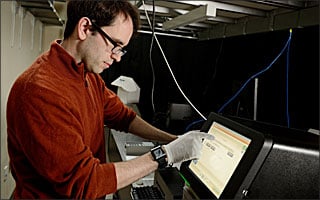Winston Timp explores the random nature of cancer

When everything’s operating properly, the cells in our bodies perform their functions in a predictable fashion. But when cancer attacks, the genetic structure supporting that performance is disrupted, and cells behave randomly.
That makes fighting cancer very difficult. So understanding the nature of the disruption — at a cellular as well as molecular level — can be invaluable in devising effective measures to battle cancer. It’s one of the areas of study for Winston Timp, a new faculty member in the Department of Biomedical Engineering.
With bachelor’s degrees in biochemistry, chemistry, electrical engineering and physics from the University of Illinois, as well as master’s and doctoral degrees in electrical engineering from MIT, Timp is able to consider the mechanisms of epigenetics from several different disciplines. His recent work includes a study that investigated the random nature of cancer due to methylation differences between normal and carcinogenic cells.
While combating cells that behave randomly sounds daunting, Timp says that his work may contribute to more effective screening and prophylactic methods of counteracting cancer. Knowing, for example, cancer’s mechanisms in the early stages of its development, at the cellular or molecular level, could lead to blood tests that give oncologists a head start in fighting the disease.
Advanced understanding of electrical engineering issues helps Timp detect one of many signals emitted by the body’s carcinogenic activity. He began his academic work studying nanotechnology in an engineering setting but became increasingly interested in the biological dimensions. “I kept adding tools to my toolbox,” he says of his various degrees. In an area as complex and important as cancer-related research, you can never have too many at your disposal.
